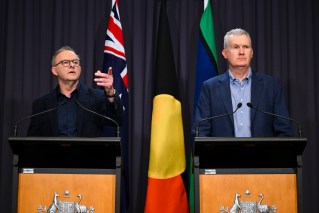How Tony Abbott got spooked by the big end of town


It’s alarming how often media references to supermarket chain Aldi feature the term ‘price war’, when a better word for what the discount store has been doing in Australia since 2001 is ‘competition’.
Yes, in Australia competition looks like ‘war’ only to oligopolists that dominate so many sectors – Coles/Woolies, Virgin/Qantas, Telstra/Optus, the big four banks, Fairfax/News Corp and so on.
Indeed, a senior Liberal Party staffer in Canberra told me in 2013 that New Zealand was only big enough for one main player in each category, and Australia only big enough for two.
• Government caves in to big business
• Danger: don’t be fooled by global share rallies
• Dear PM, stop robbing young Aussies of jobs
• Australia’s CEOs earn more than they admit
So when an Aldi starts to gobble up market share, it must be ‘war’ because this country ain’t big enough for interlopers.
Only it is. The government knows this. The big corporations know this. And the interlopers know this, but often can’t do much about it because of the market power of the incumbents.
That’s why before the last election the Abbott government promised a root-and-branch review of competition policy – a process that has been making headlines in the past couple of weeks for all the wrong reasons.

Small Business Minister Bruce Billson wants to introduce the effects test. Photo: AAP
The government stands accused of backing away from competition reforms that could give small to medium-sized enterprises (SMEs) a far more competitive environment in which to supply the larger, more powerful corporations.
To stay with supermarkets for a minute, the disruptive and subversive role Aldi is playing is to work with SME suppliers who previously had little bargaining power against the Coles/Woolies duopoly.
When a food producer has three major supermarket chains bidding for their product, they are less likely to be beaten down on price to the point of unprofitability. Four bidders is even better.
So going into the 2013 election, the Abbott team widely canvassed two reforms that were much desired by the SME sector.
The first was ‘unfair contract’ provisions, similar to those that protect consumers when, for instance, they sign up to a new mobile phone plan.
Standard contracts handed out to multiple clients (or, in the SME world, suppliers) can contain clauses that are unworkably unfair – for instance, allowing the more powerful party to vary the prices paid at their discretion.
The second was the introduction of an ‘effects test’ that would allow companies engaging in anti-competitive behaviour to be prosecuted whether or not they could be proved to be conspiring to achieve such an end.

But Coles and Woolworths are active opponents of the reform. Photo: Getty
For example, a supermarket chain that bought all suitable plots of land in an area of a city – known as ‘land banking’ – could be forced to divest sites even if it was not proven that it had bought the land to squeeze out competition. The ‘effect’ would be proof enough.
Going into the 2013 election, the SME community was excited about these developments, and incoming small business minister Bruce Billson was seen as a genuine champion of these reforms.
In a statement last month, the minister said: “Markets dominated by two or three large companies are common in Australia, occurring in many industries and at multiple levels of the supply chain. Without healthy competition, or at least the threat of competition, it can be too easy for such large dominant companies to lapse into comfortable duopolies or oligopolies to the detriment of Australia’s consumers and economy.”
This was music to the ears of industry groups such as the Council of Small Business of Australia, and Independent Contractors Australia, who thought that at last a more competitive landscape was rolling out before their members.
And then that music stopped.
Business groups lash out at government
Last week both COSBOA and the ICA hit out at the final legislative form of these reforms, which passed the lower house of parliament but are now being reviewed by a Senate committee.
At present the ‘effects test’ looks to have been diluted to the point of ineffectiveness, and the ‘unfair contracts’ provisions, according to the ICA, have been made pointless by “irrational” thresholds for the size of contracts that will be covered.
Out of the blue the government decided that contracts running for up to a year and worth more than $100,000 would be exempt from the new laws. Longer-term contracts worth more than $250,000 would also be exempt.

Executive Director of ICA, Ken Phillips.
In an angry statement, ICA executive director Ken Phillips wrote: “The Coalition didn’t promise to protect some small business people some of the time! It’s a sell-out to big business and government bureaucracy who oppose small business protections. The government’s stated excuse for doing this is irrational. We are hugely disappointed. The restriction is so bad that the Bill needs to be rejected.”
Strong words, but not as strong as those of Oliver Moon, CEO of the Combined Small Business Alliance of Western Australia – representing SMEs in a key state for the Abbott government at the next election.
In an open letter to the minister, Mr Moon wrote: “The betrayal of small business by the government by this act … is difficult to comprehend in light of the support afforded to small business by the government in this year’s budget.”
All of these complaints point to pressure by the big end of town, to force the ‘party of small business’ to water down reforms that should be part of its very political DNA.
As Peter Strong at COSBOA points out, at the recent National Reform Summit the Business Council, the banks, the supermarkets and so on were all calling for governments to show real leadership on reform.
But when that reform looks to be breathing actual competition into an oligopolistic landscape, they have ways of making the Abbott government see things their way.
Losing campaign funding from the oligarchs, or even facing hostile media campaigns funded by them – as seen against Kevin Rudd’s ill-fated mining tax in 2010 – could tip the Abbott government into an abyss of electoral misery.
On the other hand, an army of aggrieved small business organisations could do a fair bit of damage to the Coalition ahead of the next election.
Squeezed between two powerful groups? Sounds like the Abbott government is getting a taste of what many SMEs have been complaining about for years.









